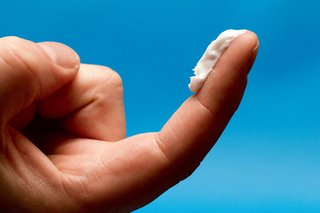Always follow the instructions from a pharmacist or doctor or the leaflet that comes with your medicine.
Dosage
You'll usually use fluticasone cream or ointment once or twice a day for up to 4 weeks. Only use it for longer than 4 weeks if your doctor tells you to.
If you use it twice a day, try to leave a gap of 8 to 12 hours between doses.
How much to put on
The amount of cream or ointment you need to use is sometimes measured by how much you can squeeze onto the end of your finger (a fingertip unit).
As a general rule, a fingertip unit of cream is enough to treat an area that's twice the size of the palm of your hand.

For babies and children, the right amount of cream or ointment depends on their age. A doctor or pharmacist can advise you.
How to apply cream or ointment
- Wash your hands and then squeeze out the right amount.
- Spread the cream or ointment in a thin layer over the area of irritated skin.
- Carefully smooth it into your skin in the direction that your hair grows.
- Use the cream or ointment on all the irritated skin, not just the worst areas.
- Be careful not to get the cream or ointment on broken skin or cuts.
- Wash your hands afterwards (unless you're treating the skin on your hands).
Do not use fluticasone skin cream or ointment at the same time as any other creams or ointments, such as a moisturiser. Wait at least 30 minutes before using any other skin product after you put on fluticasone cream or ointment.
If you need to use a dressing, like a bandage or plaster, wait at least 10 minutes after putting fluticasone on.
If you're treating a child, do not cover the cream or ointment with dressings or bandages. Using a dressing or bandage can increase the chance of side effects.
Important: Fire warning
Skin creams can dry onto your clothes and bedding. This makes them more likely to catch fire. Avoid naked flames.
How long to use it for
Most people only need to use fluticasone cream or ointment for a short time, usually up to 4 weeks. This is to get the inflammation under control.
If your skin condition is hard to control, your doctor may tell you to use fluticasone for more than 4 weeks.
Talk to your doctor before stopping treatment if you've been using fluticasone for a long time. They may tell you to gradually use less of it, and use it less often, before you stop completely. This reduces the chance of your symptoms coming back.
If you forget to use it
If you forget to use your cream or ointment, do not worry. Use it as soon as you remember, unless it's nearly time for your next dose. In this case, skip the missed dose and apply the next one at the usual time.
If you often forget doses, it may help to set an alarm to remind you. You could also ask your pharmacist for advice on other ways to help you remember to use your medicines.
If you use too much
Using too much fluticasone is unlikely to harm you. But if you use too much of this on yourself, or a child, wash the area of skin affected carefully until all the cream has gone.
If you're worried, talk to a doctor or pharmacist.
Stopping fluticasone
Talk to your doctor before stopping treatment if you've been using fluticasone for a long time. They may tell you to gradually use less of it, and use it less often, before you stop completely. This reduces the chance of your symptoms coming back.
Using fluticasone for a long time can increase the risk of having a withdrawal reaction when you stop using it. You might have a burning feeling and redness, although this may be more difficult to see on brown or black skin.
The reaction will feel different to the skin condition you've been using fluticasone for. It may cover a larger area than the area you were treating.
Important
If you get a withdrawal reaction or your condition comes back within 2 weeks of stopping fluticasone, do not start using it again without checking with your doctor.